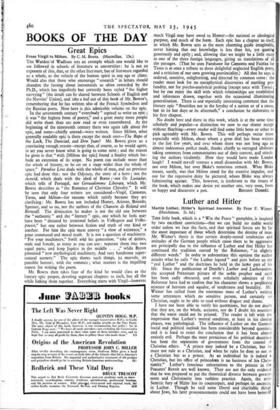BOOKS OF THE DAY
Great Epics
From Virgil to Milton. By C. M. Bowra. (Macmillan. 15s.) THE Warden'of Wadham sets an example which one would like to see followed in schools of literature at universities: he is not an
exponent of this, that, or the other literature, but of literature regarded as a whole, as the vehicle of the human spirit in any age or clime. Would also that those who encourage " research " in letters should abandon the fussing about inessentials so often rewarded by the Ph.D., which has impolitely but correctly been styled " the higher navvying " (the insult can be shared between Schools of English and the Navvies' Union), and take a leaf out of this book of Mr. Bowra's, remembering that he has written also of the French Symbolists and the Russian poets. Now here is this admirable volume on the epic.
In the seventeenth century " everybody " aspired to write an epic ; it was " the highest form of poetry," and a great many more people did write them than are now read or even remembered. At the beginning of the nineteenth century there was again talk about the epic, and some—chiefly unread—were written. Since Milton, what generally readable epic is there except the mock ones—The Rape of the Lock, The Dunciad, and Don Juan? Mr. Bowra gives us a convincing enough reason—except that, of course, as he would agree, in art you never know what is going to come next ; and the reason he gives is that " with [Milton the epic] found a finality which for- bade an extension of its scope. No poem can include more than the whole of history, or be set on a stage wider than the whole of space." Paradise Lost deals with the whole of man, and no previous epic had done this: not the Odyssey, the story of a hero ; not the Aeneid, which deals with the ideal of Rome ;• not Os Lusiadas, which tells of Portugal, nor Gerusalemme Liberata, which Mr. Bowra describes as " the Romance of Christian Chivalry." It will be seen that only four writers are considered—Virgil, Camoens, Tasso, and Milton—for reasons which satisfy because they are clarifying: Mr. Bowra has not included Homer, Ariosto, Boiardo, Spenser, and so on, nor the authors of the Chanson de Roland and Beowulf. The distinction he makes is not the old one between the "authentic " and the " literary " epic, one which he feels may have been " dictated by irrational beliefs in Volksgeist and Volks- poesie," but one rather between fiction and truth of one kind or another. For him the epic must convey "a view of existence," a great communal and moral truth. It is not a question of machinery. " For your machinery," Swift told his generation, " take of deities, male and female, as many as you can use: separate them into two equal parts, and keep Jupiter in the middle . . .," while Byron promised " new mythological machinery, And very handsome super- natural scenery." The epic shares such things, its marvels, its possible horrors, with the romance ; what matters is the impelling reason for writing the poem.
Mr. Bowra then takes four of the kind he would class as the literary epic proper, devoting separate chapters to each, but all the while linking them together. Everything starts with Virgil—however much Virgil may have owed to Homer—the national or ideological purpose, and much of the form. Each epic has a chapter to itself, in which Mr. Bowra acts as the most charming guide imaginable, never hinting that our knowledge is less than his, yet quoting generously and aptly ; and, allowing that we might be a little rusty in one of the three foreign languages, giving us translations of all the passages. (That he uses Fanshawe for Camoens and Fairfax for Tasso is at once a tribute to these delightful neglected English poets, and a criticism of our own growing provinciality.) All that he says is ordered, sensitive, enlightening, and directed by common sense: the reader must look for no metaphysical discoveries of startling pro- fundity, nor for psycho-analytical probing (except once with Tasso); but he can enjoy the skill with which relationships are established and inferences drawn, together with the occasional illuminating generalisation. There is one especially interesting comment that the literary epic "flourishes not in the heyday of a nation or of a cause, but in its last days or its aftermath," a conclusion he elaborates in his first chapter.
No doubt here and there in this work, which is at the same time scholarly and popular—a distinction we now to our shame accept without flinching—every reader will find some little bone or other to pick agreeably with Mr. Bowra. This will perhaps occur more especially with Milton, about whom a great deal has been written in the last few years, and over whom there was not long ago an almost indecorous pother made, thanks chiefly to outraged idolators taking sentences from commentators out of their context, and attack- ing the authors virulently. How they would have made Landor laugh! I would myself venture a small dissension with Mr. Bowra, not over Milton, but over Blake's notorious remark. What Blake meant, surely, was that Milton stood for the creative impulse, and not for the repressive deity he pictured, whom Blake was always fulminating against. This, however, is irrelevant to the issues of the book, which makes one desire yet another one, very soon, from


























 Previous page
Previous page